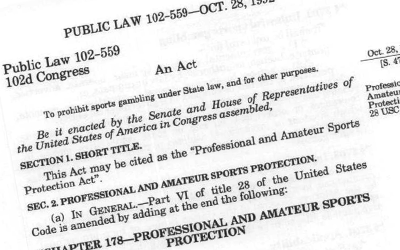The American Gaming Association (AGA) just released the results of a survey conducted by a group called Heart & Mind Strategies, which they hired to determine whether licensed and regulated sports betting has affected the illegal sports betting business. The group and AGA identified illegal sports betting as anything not sanctioned by the government. According to the report from the AGA, illegal gambling in the U.S. has declined by 25% since the Supreme Court repealed the Professional and Amateur Sports Protection Act (PASPA). While that number seemed high, it wasn't overly surprising, since in 2012 a similar survey was conducted by U.S. Gaming Survey and queried whether the Black Friday raids by the FBI in 2010 would affect players' wagering on poker. The results of that survey indicated that most respondents had stopped wagering on poker offshore after the Black Friday raids and were waiting for legalized government sanctioned poker before they would play again. While the survey mostly focused on poker, there was also some questions asking about sports betting and the results were similar. However, after speaking to a few offshore sportsbooks, as well as some illegal local bookmakers that I have come to have acquaintance with over the years, it appears that the survey may not be completely reflective of the situation.
While that number seemed high, it wasn't overly surprising, since in 2012 a similar survey was conducted by U.S. Gaming Survey and queried whether the Black Friday raids by the FBI in 2010 would affect players' wagering on poker. The results of that survey indicated that most respondents had stopped wagering on poker offshore after the Black Friday raids and were waiting for legalized government sanctioned poker before they would play again. While the survey mostly focused on poker, there was also some questions asking about sports betting and the results were similar. However, after speaking to a few offshore sportsbooks, as well as some illegal local bookmakers that I have come to have acquaintance with over the years, it appears that the survey may not be completely reflective of the situation.
Two operators located in Costa Rica that I spoke to, told me that business has never been better. One operator in particular, in a conversation last night, said that they have changed the way that they cater to the U.S. market, particularly with funding, but he said the actual number of customers is similar, if not higher, than it was before the repeal of PASPA:
"Our customer base is better than ever. A few years back when payment processing was a struggle, a lot of our better customers left and told us that they were returning to their local bookies because they were frustrated with not being able to fund their accounts the way they want. But after we started accepting Bitcoin, many returned to us and we acquired several new customers who loved the cryptocurrency. It took a while for our older customers to accept Bitcoin as a payment method and understand how it worked, but with a little training and hand holding, they soon realized how easy and convenient it was to fund accounts and receive withdrawals, as well as how easy it was to get a withdrawal to their bank from a cryptocurrency exchange. Actually, a few of my older customers who came back said it was better than the wild west days of NETeller. The number of bets in our sportsbook has increased each of the last 5 years and our handle is great too. We were never that concerned about state sanctioned U.S. sports betting because our lines are far better than states can offer and I don't think the majority of our customers would play with a state sanctioned sports book because they want to be anonymous and able to bet without worrying whether the FBI or the IRS are watching them. And similarly, I think there are a lot of new sports bettors who would never play with an offshore book under any circumstances. I’m not sure who the survey respondents were, but I know they didn't poll our players."
The owner of the other Costa Rican sportsbook, who I talked to last year about his operation after the repeal of PASPA, reiterated what the first operator said, but he added that his business has actually increased since the repeal of PASPA.
"I think a lot of Americans were worried about betting on sports, since they believed they were breaking the law. But after SCOTUS repealed PASPA and states started licensing their own bookmaking operations, there was a new belief that all sports betting was now legal. So, players reached out to us to set up accounts because they believed the courts and governments now authorized them to bet on sports. And we have far more betting options, far better lines and far better promotions than any state could ever offer. Most of our U.S. customers use Bitcoin to fund and withdraw from their accounts but I would estimate that at least 1/3 of our U.S. customer base still fund their accounts by wire transfer and a credit card option that we provide. Plus, if they want to receive a withdrawal by check that is still quite possible. We cringed a bit when the Supreme Court repealed PASPA fearing we’d lose business, but we now celebrate that decision because it brought in a whole new customer base to us. I have no doubt that there are many Americans who will only bet with U.S. government licensed sportsbooks, but the sharps and wiseguys who want to wager more than a few hundred a game and who aren’t interested in a 30 cent line still turn to offshore operators like us to place their bets. And we welcome their business, since we believe our traders are tops in the business."
Illegal, underground bookmakers on the other hand are a different story. I have known four underground bookmakers located in Los Angeles, Pittsburgh, Trenton and Detroit who I’ve used for quotes on stories in the past, and the one located in Pittsburgh closed his operation not long after the repeal of PASPA. The bookie in Pittsburgh said he was seeing a decline in betting just prior to the repeal of PASPA and he knew he wouldn't be able to compete with state sanctioned sports betting, so he simply closed shop and took his winnings, which he said he could live comfortably off of for the rest of his life. He said in a way it was a relief not having to worry if the cops would be breaking down his doors. The bookie in Chicago just closed his operation in May of this year, but he said it had nothing to do with the repeal of PASPA.
"I'm getting older and I just don't need this anymore," he said. "I always said that if the right reasons were there to convince me to leave I would do so. And with this crazy virus and the cancelling of all the sports . . . I said to myself that now is the time. I am not one to book soccer, horse racing or motor sports so there was really nothing to put odds up on and with the business on leave it gave me time to spoil my children and grandkids. I had a new focus on life so now just seemed like the right time to get out. Don’t get me wrong, before this COVID thing hit I was doing as well as ever, but I just have to move on with my life and focus on the important things."
I reached out to the bookie in Trenton and was unable to get in touch with him, but the bookie in Los Angeles said he was raking in the dough since California has not legalized sports betting and, in his view, the state will never legalize sports betting. Like all sportsbooks, his operation has been slow due to COVID-19 but he said he had more customers than ever prior to the pandemic and when SCOTUS repealed PASPA he had people come to him to bet because they were livid that a product that was now deemed legal was still inaccessible to California residents.
Since the repeal of PASPA, a couple of sportsbooks closed operations, including The Greek, but the reason for that closure could not be blamed on the SCOTUS decision, since The Greek stopped accepting U.S. action almost a decade ago.
According to the AGA the survey by Heart & Mind Strategies was conducted in the months of December 2019 and January 2020, so the pandemic would not have affected the survey results. And I have no doubt that a lot of people who were on the sidelines and would never wager with offshore or underground bookies have started wagering with legal state licensed sportsbooks, which might be a reason for it appearing that state licensed sports betting has taken away business from the offshore and underground market. But from the comments I received from offshore books, business is still booming and, if anything, has picked up thanks to the repeal of PASPA. It appears that many leery offshore bettors now accept that sports betting as legal and have less qualms about betting at their favorite offshore sportsbooks. And most offshore books welcome the competition. Perhaps one bookie put it the best:
"Gambling is like any business. As more people enter, more competitors enter as well. Your piece of the pie may get smaller, but it's a growing pie so 5% of a 50" pie is just as good as 25% of a 10" pie. The goal is to get 6% or more of the larger 50" pie, and if you have a good business with solid credentials, that likely will happen. We're just happy that we can grow with the industry."
Read insights from Hartley Henderson every week here at OSGA and check out Hartley's RUMOR MILL!







































